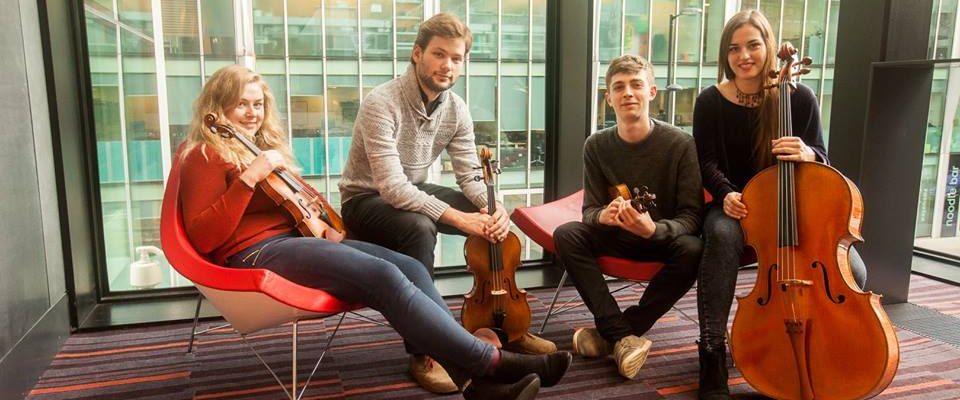Young Artist Interview: Ida Ränzlöv
“I love to portray the outrageous, spoiled, scorned woman. It’s so much fun and incredibly liberating to have a green light to be completely crazy on stage”. Swedish mezzo-soprano Ida Ränzlöv is currently a member of the Staatsoper Stuttgart Opera Studio, a Glyndebourne Jerwood Young Artist 2018 and, as a Maisie Lewis Young Artists award winner, a Yeoman Young Artist for The Musicians’ Company. A graduate of the Malmö Academy of Music and Royal College of Music’s International Opera School (RCMIOS), Ida’s recent roles include Kate Pinkerton Madama Butterfly (Glyndebourne 2018), Fox The Cunning Little Vixen (RCMIOS 2017), Daughter The Vanishing Bridegroom (British Youth Opera 2017), Faramondo Faramondo (London Handel Festival 2017) and Arminda La finta giardiniera (RCMIOS 2016).
What inspired you to become an opera singer?
When I was 17 my dad and I went on holiday to Italy and he took me to see Carmen at the Arena di Verona. As soon as the singers opened their mouths to sing I was just amazed that the human voice could make a sound like that, unamplified! Ever since that moment I’ve been completely captivated by the art form that is opera. I’ve always believed that storytelling is what brings people together. Opera became the ultimate way of telling a story, combining all artforms into one.
Describe the last year in 5 words
Bewildering. Curious. Courageous. Devotion. Gratifying.
Tell us about your role in Madama Butterfly.
As a Jerwood Young Artist (a training programme for young singers) at Glyndebourne this summer I got to perform a small role in one of the festival productions. I performed the role of Kate Pinkerton, the American wife of B. F. Pinkerton. She’s the classic character that shows up at the end of an opera and turns the piece into a tragedy, making the audience realise that the story will not end happily. It was a great challenge trying to get the audience to sympathise with a character whose existence brings so much suffering to the life of the heroine. It was a true privilege to get the chance to work with and learn from the incredible cast, conductor, director and orchestra.
How do you memorise an opera role?
I start with going through the text, and after that it’s many hours at the piano in a practice room, going through the score and learning the music. I write it all down in a little notebook, along with pronunciation and translation, then carry it with me everywhere to read whenever I have a moment. There’s a lot of mumbling to myself on the tube and humming on sidewalks!
How do you keep your voice healthy?
Having your instrument inside your body makes being a singer very different from other musicians. It means having to keep physically fit, eat well and keep yourself in a good mental condition. If I get a cold I can’t do my job properly, so I try my best to be healthy. This includes not worrying too much and I’m a firm believer in “What you think, you become”. I do singing exercises and practice almost every day which gives me confidence I’m taking good care of my voice and keeping it in shape!
What other roles have you most enjoyed?
I have two different types of characters that I love to perform on stage. The first one is the typical trouser role hero and I very much enjoyed singing the title role in Faramondo for the 2017 London Handel Festival. It was my first experience of singing a Handel role. Learning the basics of singing Handel with one of the greatest musicians of historical performance today, Laurence Cummings, was incredible and I feel very lucky to have been given that opportunity.
The second type of character I love to portray is the outrageous, spoiled, scorned woman. They’re often found in Mozart operas, such as Dorabella in Cosí fan tutte. My first role at the RCMIOS was Arminda in Mozart’s La finta giardiniera. It’s so much fun and incredibly liberating to have a green light to be completely crazy on stage and do all the things that are considered perhaps less ‘acceptable’ in real life!
What do you think of the trend for opera in cinemas?
Opera is in a position today where it needs to attract a new audience (while keeping the current one happy). One way of doing that is to make it more relevant to today’s society. Cinema showings are a great way to spread opera to a wider audience and make it more accessible. I believe it makes people more curious and encourages them to experience it live, which is what I, as a performer, want to happen!
What do you like doing away from the stage?
I love being in nature and going to places I’ve never been to before. One doesn’t have to travel far to discover something new. When not singing, I mostly enjoy spending my time with friends and family, eating tasty food.
What’s next?
I’ve just started the season 18/19 here at Staatsoper Stuttgart, and am busy discovering a new culture and learning a new language (and new roles!). My singing has so far taken me to places I only dreamt about, and I hope it will continue to do so.
You can find out more about Ida on her yeoman page or website.
Interview by Suzy Willmott @suzywillmott





